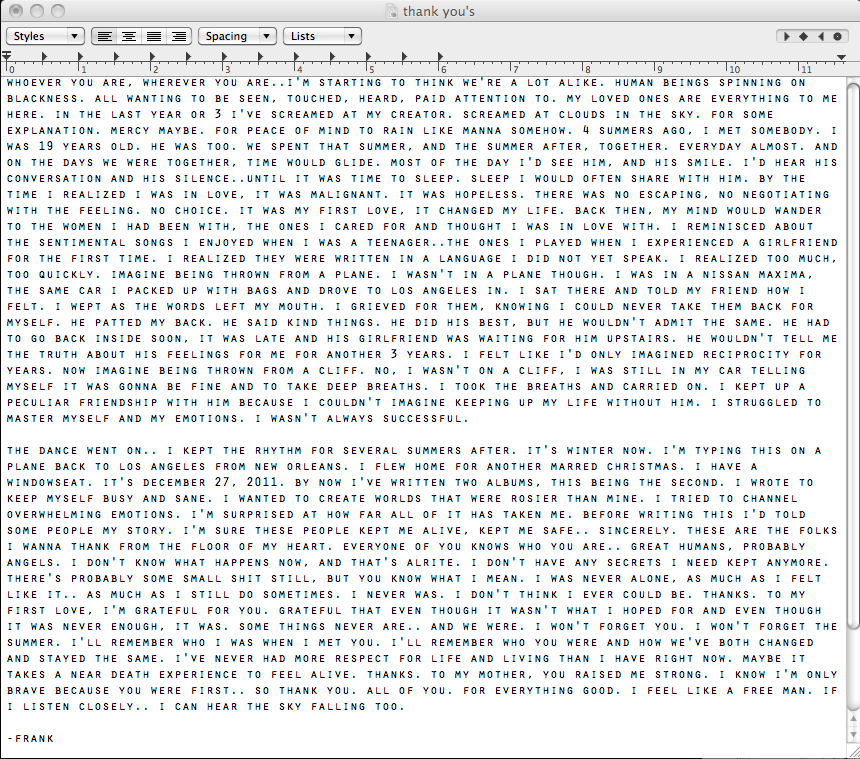It’s a rare, precious thing when an artist pours themselves into a record so completely that it becomes an instant classic. At a time where typically elitist music fans were bemoaning the loss of true artistry and the death of The Iconic Album, it was an utter privilege to behold the drop of Frank Ocean’s much-anticipated debut full length offering, Channel Orange. Instantly, it captured the awe and adoration of the music world so quickly and wholly. It’s self-reflective openness matched with a skillful exploration of genres bolstered the singer’s already renowned skills as a songwriter and brought the world a truly complete album that will continue to stand the test of time, perhaps for evermore, as it influences upcoming artists and finds its way onto favourite albums of all time lists.
Prior to releasing Channel Orange, Ocean made the move from New Orleans to Los Angeles for what evolved from a six-week temporary stay to something much more significant when he began to develop contacts in the music scene there. Eventually earning himself a songwriting contract, he penned tracks for huge industry names, including Beyonce, Brandy, John Legend and Justin Bieber. Having begun work with Nas and Pharrell Williams, he eventually joined the now-disbanded collective Odd Future in 2009. Later that year, the singer-songwriter signed to Def Jam Recordings as a solo artist. However, it was a couple of years until he released his first mixtape, nostalgia,ULTRA, which provided perhaps the first real glimpse into the inner-workings of his mind and his primary interests as a songwriter: relationships, self-reflection, social commentary. The singles released from the mixtape, Novacane and Swim Good signalled the arrival of a songwriter capable of blending the morose and gritty through a filter of nostalgia as he dealt with themes including suicide, failed relationships, isolation and drug use.
Between his first mixtape and his debut album, Ocean worked on Kanye West and Jay-Z’s Watch the Throne, co-writing and featuring on two tracks No Church in the Wild and Made in America. It was this same year that a track that would eventually be re-worked for Channel Orange, Thinkin Bout You (originally written for Bridget Kelly) found itself posted on his personal Tumblr blog before receiving an official release on Kelly’s album. In 2012, a re-worked version leaked online; it was the lead single for his debut – and as of right now, only – album.
Released to critical acclaim, Channel Orange quickly made its mark as one of the greatest R&B releases of recent years, if not ever. That it was a debut album made it all the more spectacular, with Ocean using 17 glittering tracks to explore his influences and emotions. He rapidly became an icon in popular culture, adding to his list of accomplishments his sound-tracking of an episode of the final season of Gossip Girl.
With Monstrous Ball, Ocean became the first artist to exclusively soundtrack an entire episode of the popular show and also marked the first instance in which his music was used on a television show in one fell swoop. For some, this was the first exposure to his music, with Super Rich Kids, Sweet Life, Thinkin Bout You, Lost and Pyramids all featuring. The show had developed an incredible reputation for its soundtrack during its five-year run, and this episode alone introduced his music to thousands more. In turn, he blew up once more online, the place where he still seems to be most comfortable sharing his thoughts.
Through his preferred social media platform, Tumblr, Ocean has often been able to express himself and address the complexities of sexuality, love and loss throughout his career. It was there that a mere six days prior to the release of Channel Orange, he shared an open letter recounting the story of his first love – another man at the age of 19. Revealing that he was bisexual or gay, the letter was intended for the liner notes of Channel Orange. Instead, it was uploaded preemptively, perhaps because he knew of how much speculation would come following the intimate lyrics on Channel Orange, or he simply didn’t want to wait or hide any longer, or perhaps both.
He sings of his unrequited love for another man on Bad Religion; “I could never make him love me/Never make him love me/Love me,“ and opted not to change the pronouns on his version of Thinkin Bout You “My eyes don’t shed tears, but, boy, they bawl/When I’m thinkin’ ’bout you”.
The letter, seemingly unedited and candid, ended with the words “I feel like a free man. If I listen closely.. I can hear the sky falling too.” Shortly after uploading to Tumblr, the music world looked on with baited breath, no doubt attributed to the fact that Odd Future had been criticised in the past for their homophobic lyrics, despite the fact that their sole female member, Syd tha Kyd, is openly gay herself. Instead, what followed was evidence that Frank Ocean was not only a free man, but one who, for the most part, had the support and admiration of his musical community.
My Big Brother Finally Fucking Did That. Proud Of That Nigga Cause I Know That Shit Is Difficult Or Whatever. Anyway. Im A Toilet.
— Tyler, The Creator (@fucktyler) 4 July 2012
Perhaps most poignantly, hip-hop mogul and Def Jam co-founder Russell Simmons wrote that he was “profoundly moved by the courage and honesty of Frank Ocean.” Adding, “Today is a big day for hip-hop. It is a day that will define who we really are. How compassionate will we be? How loving can we be?” It was unsurprising that his motives were called into question by the likes of the notoriously homophobic 50 Cent, who considered the timing of his letter to be all too close to the release of his album, citing it as a marketing ploy above anything else.
It could be revolutionary or it could be a tragedy. You can call it brave or you can call it marketing, because it was intentional; it wasn’t an accident.
He was right about one thing: the letter was intentional – but boiling something so significant down to a marketing ploy was particularly insulting and overshadowed 50’s show of support when he said “anyone who has a problem with Frank Ocean is an idiot.”
The honesty and openness he showed to a world where homophobia has traditionally not only been acceptable, but encouraged, was not only brave, but showed that he has perhaps taken on a kind of responsibility to pave a safe path for those to come. For, as Pitchfork wrote at the time of Channel Orange’s release:
For a culture that accurately prides itself on sonic progression, hip-hop and R&B can be woefully conservative when it comes to sexuality. This is changing, and Frank Ocean is helping it to change, and if his revelation inspires others to understand themselves or the world more fully, then that could be one of Channel Orange‘s finest legacies. But it will not be the album’s only legacy. – Pitchfork
Just as the influence of his panache for genre-fusing can be found in music coming out today, Ocean’s openness about his sexuality continues to fuel the discussion of homophobia in hip-hop. In 2014, T-Pain spoke in an interview with VladTV about rappers he knew who would “not do a song with Frank Ocean just because he gay, but they need him on the fucking song and that’s so terrible to me, man…”
The significance of Frank Ocean and his influence does not begin and end with his being an out R&B and hip-hop artist. Certainly, it tends to inform the discussion surrounding his work, but above that it is the openness of emotion in his lyrics and his use of musical textures throughout the impressive album that ensures its staying power. In Channel Orange, Frank Ocean created intricate layers of psychedelia, R&B hip-hop and soul; influences ranging from Marvin Gaye to Pink Floyd – Prince to Stevie Wonder noticeable but never imitated. There’s a very good reason that the internet has so relentlessly hounded every possible notion, every hint of a chance that his follow up album might be on its way at some point, and that’s because of its quality, depth, realness, and soul.
Personally, it has been the only album that I have been able to sit in a room with my brother, with whom I rarely see eye-to-eye on when it comes to musical preferences, and listen to all the way through before we press repeat. It is also the only CD from my collection I have ever dared bring into my place of work.
There is little doubt that the next cited due date for a follow up to Channel Orange will come and go without a peep from the singer. It is highly likely that we will not hear a bar of Boy’s Don’t Cry for some time longer, and although we’re hungry for more, we’re in no rush, and there’s no need to add any pressure or arbitrary deadlines.
Revisiting Channel Orange in all its luscious glory can satiate us all a little longer and urge us to wait a little more patiently and perhaps give Frank Ocean the space he needs. Certainly, listening to it all day today has done so for me.
Image: Consequence of Sound


